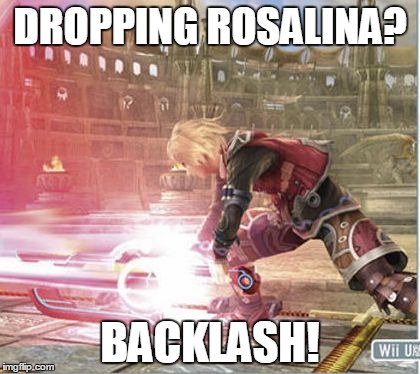Hold onto your butts, because I'm about to get controversial.
I entirely agree that games are art. But I feel like people are going about it the wrong way.
For example, I feel like people tend to point to things like aesthetics or narrative to support their arguments. This is not a good thing to focus. Yes, it is entirely possible to make a beautiful looking game, but you can't try to apply the same logic as you would to a painting. In-game graphics and a painting are very different beasts, and you can't really apply the same rules to them. With a painting composition is prime since no matter where you are the painting is unchanging. A game? Depending on what the player is doing with the camera and where they're located and what they're doing the way the images are perceived is going to change.
Then we get to narrative. I might burst a lot of bubbles here, but most video game stories suck. Even the best stories that video games have to offer, Metal Gear Solid, Bioshock, Persona 4, if any of these were books (hell, some of them are) they wouldn't even make a dent in the literary world. Not that these stories are bad or not enjoyable, it's just that video games aren't really an optimal story telling tool. At least not in the traditional sense.
The thing that makes games special is their ability to interact with a player. For example, Pokemon. Early in the game you find Pokeballs on the ground that contain items. This teaches you that by interacting with Pokeballs you get some extra items. Then, it happens. You touch a Pokeball expecting to get an item only to be attacked by a Voltorb. Classic mimic trap. Now you're not entirely trusting of those once-helpful Pokeballs. With one simple mechanic the game was able to create expectations and generation emotions in a player. And this is where games succeed and should be praised, for how they can convey damn near anything through player interaction.
This applies to storytelling too. Going back to the previously mentioned Bioshock, the thing that sets that game's story apart is how it reaches out of the TV and plays the player. Spoilers for an eight year old game: Throughout the game your friendly mission control friend name Atlas has a little verbal tic where he tends to say "Would you kindly." Chances are, you went through the entire game without even thinking once about it. Then, during the confrontation with the game's big bad guy, Andrew Ryan, you discover that the words "Would you kindly" were a trigger that was programmed into you to force you to obey. That's right, the entire game you, the player, were Atlas' puppet. That's just something you can't do in a movie or a book.
Granted, this also ties into my theory that a good sixty percent of the gaming community doesn't know the first thing about game design and doesn't care to learn. Probably why people have to default onto things like graphics, music and story to define a game as good, or in higher cases, art.
And don't even get me started on "ungames" that seem to think that being esoteric is all there is to being art. I feel like these miss what makes games special above all else.
 finalark
@
finalark
@
 Spak
This is exactly why I don't read comics. I've read a few manga and webcomics and generally like the art form, but American comic books require too much investment in time and money. Especially when half the continuity is ignored because it's too much for even the writers to understand. I'd be mostly okay with the investment if the continuity mattered, because I like really involved stories. My time spent watching Atop the Fourth Wall seems to indicate that ignoring continuity is pretty much the norm, though.
Spak
This is exactly why I don't read comics. I've read a few manga and webcomics and generally like the art form, but American comic books require too much investment in time and money. Especially when half the continuity is ignored because it's too much for even the writers to understand. I'd be mostly okay with the investment if the continuity mattered, because I like really involved stories. My time spent watching Atop the Fourth Wall seems to indicate that ignoring continuity is pretty much the norm, though.


 Deal with it
Deal with it 